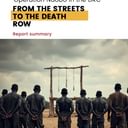
In an October 10 statement commemorating World Day Against the Death Penalty, United Nations Secretary-General Ban Ki-Moon (pictured) urged the global abolition of capital punishment and called the death penalty ineffective and counterproductive as an anti-terrorism tool. Saying that capital punishment not only “has no place in the 21st century,” Secretary-General Ban also noted that executions of terror suspects have been counterproductive: “Experience has shown that putting terrorists to death serves as propaganda for their movements by creating perceived martyrs and making their macabre recruiting campaigns more effective.” Ban said that, “[t]o be legitimate and effective, counter-terror measures, like all security operations, must be anchored in respect for human rights and the rule of law.” In particular, he critiqued vague anti-terrorism laws that states have used as a pretext to target political dissidents: “Let us be clear: participation in peaceful protests and criticism of a government – whether in private, on the Internet, or in the media – are neither crimes nor terrorist acts. The threat or use of the death penalty in such cases is an egregious violation of human rights.” At a conference in Geneva held in conjunction with the World Day Against the Death Penalty, UN human rights experts decried the swift and unfair trials and death verdicts often handed down in terrorism cases and emphasized the heightened need for rigorous legal safeguards in terrorism cases. “Executions carried out without adherence to the strictest guarantees of fair trial and due processes are unlawful and tantamount to an arbitrary execution,” three UN Special Rapporteurs said. “We have called on those governments once and again to halt such executions and to retrial the defendants in compliance with international standards.”
(“On World Day against Death Penalty, Ban says practice ‘has no place in the 21st century’,” UN News Centre, October 10, 2016.) Learn more about World Day Against the Death Penalty here. See International.


